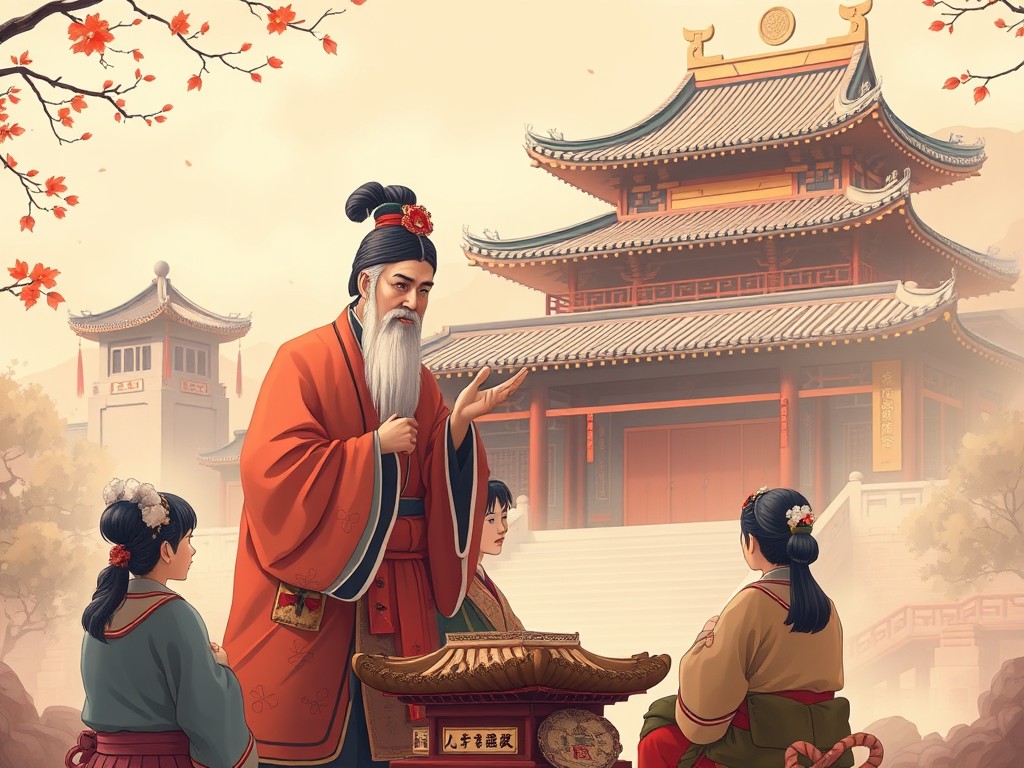A Symbiotic Bond: Exploring the Responsibilities of Rulers and Subjects
Ruler and Subject: A Core Relationship in Confucianism
In Confucianism, the relationship between ruler and subject is one of the five fundamental relationships that define social harmony and order. This particular dynamic emphasizes mutual responsibilities and ethical governance. Here’s a deeper look at this relationship:
Key Principles
- Moral Leadership:
- The ruler is expected to embody moral integrity and virtue. A good ruler leads by example, demonstrating qualities like benevolence (ren) and righteousness (yi).
- Responsibility of the Ruler:
- The ruler has a duty to care for the well-being of the subjects, ensuring their safety, happiness, and prosperity. This is often referred to as the “Mandate of Heaven,” which states that a ruler’s authority is justified by their moral character and ability to govern justly.
- Loyalty of the Subjects:
- In return, subjects are expected to show loyalty and obedience to the ruler. This loyalty is rooted in respect for the ruler’s authority, provided that the ruler acts justly and ethically.
- Social Harmony:
- This relationship is crucial for maintaining social harmony. When rulers act justly, subjects are more likely to support and respect them, leading to a stable and harmonious society.
- Consequences of Poor Governance:
- If a ruler fails to uphold their moral responsibilities, Confucianism teaches that subjects have the right to withdraw their loyalty. This idea has historically influenced the legitimacy of rulers in Chinese society.
Featured Headlines:
-
Guide to Teacher Promotion with TSC
Spread the love 🌟 Guide to Teacher Promotion with TSC 🌟 Unlock your career potential with the Teachers Service Commission’s fair and transparent promotion process! 🚀 Follow this step-by-step tutorial to understand eligibility, application, and key guidelines. 📚 Introduction to TSC Teacher Promotion The Teachers Service Commission (TSC) is dedicated to supporting teachers’ career progression…
-
History of Teachers Service Commission (TSC)
Spread the love 📚 History of Teachers Service Commission (TSC) 🎓 From grassroots movement to established institution 📅 Historical Timeline 1950s 👥 Teacher-Led Movement Teachers, led by retired President Daniel T. Moi, vigorously fought for the formation of a unified teacher body. 1957 🏛️ First Teachers Union Formation of Kenya National Union of Teachers (KNUT)…
-
TSC TEACHER PROMOTIONS 2025-2026
Spread the love 📢 TEACHERS SERVICE COMMISSION PROMOTIONS 2025-2026 🎯 Career Advancement Opportunities for Kenyan Educators ⏰ APPLICATION DEADLINE 📅 Monday 25th August, 2025 at Midnight 🌐 Apply online: www.teachersonline.go.ke ❌ Manual applications will NOT be accepted 📋 TOTAL POSITIONS 10,000+ 📚 GRADE LEVELS T-SCALE 7-15 🧑🏫 CATEGORIES Regular/SNE/TTC 📌 IMPORTANT NOTES TSC is an…
Historical Context
Throughout Chinese history, the relationship between ruler and subject has been pivotal in shaping political and social structures. Dynasties that emphasized Confucian ideals often promoted meritocracy and moral governance, while those that strayed from these principles faced challenges to their authority.
Contemporary Relevance
In modern discussions about governance, the ruler-subject relationship continues to be relevant. Concepts of accountability, ethical leadership, and the role of citizens in a democracy echo the teachings of Confucianism, highlighting the timeless nature of these principles.
Conclusion
The ruler-subject relationship in Confucianism emphasizes mutual respect, moral responsibility, and the importance of ethical governance. By fostering a balance between authority and moral integrity, this relationship aims to create a harmonious society where both rulers and subjects thrive.












